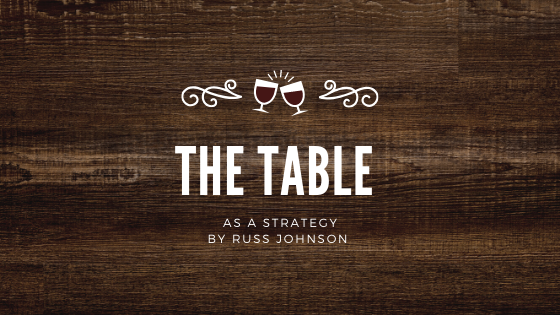
Russ Johnson is the Founder of the Table Network & Creator of Reclaim Training. He co-authored Slow Down, Reclaim, and co-hosts The Slow Down Podcast. As a catalytic leader, coach, and speaker, his primary focus is gospel movement in a world disinterested in church. We recently asked Russ to give us insight on his table strategy and why he believes it will work.
I spent 14 years leading conventional churches, I got to see two traditional churches make a shift, plant a growing church, and create a culture in a major city that led to 50 missional communities and 3 new church plants. I am thankful.
There was just one thing I couldn’t shake: We weren’t really reaching the 70% of society with no interest in church gatherings.
At first, we thought upgrading the Sunday service would reach those uninterested in church, but we soon found offering something different only works for the 30% open to “something better.” For the 70%, we had one question:
Jesus told us to make disciples, but how if people aren’t interested in our church forms?
In the search for answers, we realized: While it’s true that 70% of society is uninterested in church gatherings, it’s also true they all have to eat. It’s our most primitive mandate. So if you want to focus on the 70%, go where they are.
Too simple? Not if you understand: 1) Why this strategy works; and 2) What is required.
Why a table strategy works
The table works because it’s biblical. While Jesus indeed spoke once in a synagogue and at a hillside to crowds from time to time, the table was a consistent place of ministry from beginning to end. His last ministry moment before his death wasn’t a message to the masses or a miracle, but a meal. And according to the New Testament, the Church followed his example.
The table works because it’s simple, a practice found in every culture. The Church seems to be the only community who complicate this. To that end, Eugene Peterson is helpful: “Not everyone can comprehend a doctrine, not everyone can obey a precept, but everyone can eat a piece of bread, drink a cup of wine, and understand a simple statement — my body, my blood.”
The table works because it’s easily reproducible. When the Church is a movement of people following Jesus, rather than a place, the gospel easily spreads through the hands and around the tables of every believer. It’s an approach to ministry that allows us to ask: What could the Church do here if it wasn’t in need of tithes and volunteers to support salaries and services?
As I laid out these reasons for “why” the table, more and more people grabbed on. There was just one problem: They were discipled to go to church, not BE the Church where they are. They knew how to attend services, sing, listen, and volunteer, not “make disciples” as Jesus said. (Matt 28) Helping them live in the movement Jesus actually started became our greatest need.
What is required for a table strategy to work
People wrestle with making disciples because they’re too focused on themselves; on their own perfection. True influence begins where self-preservation dies. In Jesus, we have nothing to prove. God didn’t start a work through His Son, He completed it.
If your aim is to see every believer step into the mission of Jesus, you will need to help them experience the grace that’s set them free to be real, to love, to connect.
People struggle to disciple others because they feel incompetent outside of structured, curriculum-based environments. With most people having no interest in these forms, we’re gonna need to teach others to reach people they already love; anywhere, at anytime.
If your aim is to see every believer step into the mission of Jesus, then you need to help them know-how to disciple others in the natural flow of life around tables.
People can’t love others well when they’re racing past them from one church event to the next. To gain a listening ear from someone is something that requires trust, and trust takes time. So if it’s relationships with people you desire, then slowing down you must.
If your aim is to see every believer step into the mission of Jesus, then they need the time, the margin in life, to actually walk with those they love.
Seeing the biblical, simple, and reproducible nature of the table, and seeing what we need to do to help people step into this, was the start of something good. Establishing a tool that empowers this narrative has been even better. If your aim is to reach your city, you will need a way to empower a movement that carries love and Good News to 100% of your context.
We’re here to help.
The ball is in your court.
Russ Johnson
https://www.thetablenetwork.com
https://www.reclaimtraining.com

Today, he resides in South Florida with his wife, Christa (21yrs), and their three children.

0 comments
Write a comment